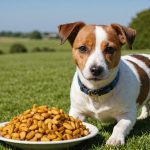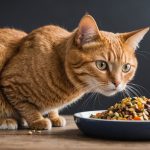Understanding Senior Rottweiler’s Nutritional Needs
As Rottweilers enter their senior years, their dietary requirements undergo significant changes due to age-related nutrient needs. It’s crucial to ensure that their diet is tailored to support their evolving health conditions.
Age-Related Nutrient Changes
Senior Rottweilers often require adjustments in their dietary plan to meet their specific nutrition needs. This includes increased attention to vitamins and minerals, as their metabolism slows and the body becomes less efficient at absorbing nutrients. Key nutrients such as calcium and phosphorus are essential for maintaining bone health, which can become a concern as these dogs age.
A lire en complément : Essential Tips for Creating a Burrowing-Friendly Habitat for Your Prairie Dog Pets
Key Nutrients for Senior Dogs
Protein remains a critical component of Senior Rottweiler nutrition to preserve muscle mass and overall canine health. However, the protein should be high-quality and easily digestible. Additionally, certain fatty acids are beneficial for joint health, often compromised in older dogs. Antioxidants play a role in supporting the immune system, which can become weakened with age.
Weight Management
Maintaining an appropriate weight is fundamental for a senior Rottweiler’s health and longevity. Overweight dogs are at increased risk of developing conditions such as arthritis and diabetes. Therefore, monitoring calorie intake while providing a nutrient-rich diet can significantly impact their overall health and quality of life.
Avez-vous vu cela : Essential Tips for Creating a Burrowing-Friendly Habitat for Your Prairie Dog Pets
Portion Control and Feeding Guidelines
Managing the dietary needs of a senior Rottweiler involves understanding the balance between calorie intake and energy expenditure. To determine their ideal daily energy requirements, one must consider factors like weight, age, and activity levels. Most senior Rottweilers need fewer calories due to decreased activity.
Calculating daily calorie needs can be simplified using the formula: calorie intake = weight in kilograms × resting energy requirement (RER) factor. An average senior Rottweiler may require about 30 calories per kilogram of their body weight daily. Adjustments should be made based on whether they need to gain, maintain, or lose weight.
Portion sizes are equally significant. For a 40-kilogram Rottweiler, a typical portion could range from 1,200 to 1,600 calories per day, split across meals. Varying these portions alongside their feeding schedule can help regulate their appetite and metabolism, as well as support proper digestion.
Maintaining a consistent feeding schedule is crucial. Senior Rottweilers may benefit from meals 2-3 times daily at regular intervals. This predictability helps them manage hunger and ensures they receive a balanced diet, preventing overeating or underfeeding. Regular monitoring allows for necessary adjustments based on the dog’s health evolution.
Recommended Food Types for Senior Rottweilers
Providing the right nutrition is crucial for maintaining the health of senior Rottweilers. Choosing the best senior dog food involves understanding different dietary options available.
Commercial Diet Options
For senior Rottweilers, commercial diet options are specially formulated to cater to their unique dietary needs. These diets often include high-quality ingredients essential for joint health, digestion, and maintaining an optimal weight. When selecting food, scrutinizing pet food labels for the listed ingredients is vital. Look for foods rich in proteins, containing named meat sources, and devoid of artificial additives.
When debating between grain-free options and grain-inclusive diets, it’s important to consider the dog’s specific health requirements. Grain-free foods are popular due to their emphasis on proteins and vegetables while avoiding grains that some dogs may be allergic to.
Homemade Diet Considerations
Preparing homemade meals for senior Rottweilers can have its perks, such as using high-quality ingredients and catering to specific dietary restrictions. However, there are risks such as potential nutritional imbalances. A balanced homemade diet should include proteins, carbohydrates, fats, vitamins, and minerals. Consulting with a veterinarian ensures that the meals support the dog’s health needs effectively. Proper guidance helps in crafting a nutritious and balanced meal plan that’s tailored to your pet’s specific requirements.
Identifying and Managing Obesity in Senior Rottweilers
Understanding and addressing dog obesity signs is crucial for maintaining your senior Rottweiler’s health. An overweight dog may exhibit a lack of waist definition and difficulty feeling its ribs through gentle palpation. These are common indicators that your Rottweiler might be carrying extra pounds. Ensuring your dog maintains an ideal weight is essential in avoiding the numerous health risks associated with obesity.
Obesity significantly increases the chance of developing various health issues, including joint problems such as arthritis, diabetes, and cardiovascular diseases. Additionally, excess body weight can lead to a reduced quality of life and shortened lifespan. It’s vital for pet owners to understand these risks to advocate for their dog’s well-being.
When approaching weight management, consider implementing dietary adjustments, such as incorporating portion control and selecting nutritionally balanced foods developed for senior dogs. Integrating regular exercise suitable for your dog’s age and physical capabilities is also important. Examples include gentle walks or low-impact play.
A practical solution may also involve consulting with a veterinarian. They can provide comprehensive advice tailored to your dog’s specific needs, ensuring effective weight management and preventing further health complications. Understanding and acting on these points can significantly improve your Rottweiler’s overall health and longevity.
Common Dietary Pitfalls to Avoid
When managing a dog’s diet, human food risks are a significant concern. Some foods, although harmless to humans, can be toxic to dogs. For instance, chocolate, grapes, and onions are known to be particularly dangerous. It’s essential to understand which items can cause harm and ensure they remain out of your pet’s reach.
Additionally, unhealthy snacks present another challenge. While offering treats is common, excessive indulgence can lead to weight gain and other health issues. It’s important to be mindful of the frequency and quantity of unhealthy snacks and reconsider the types of treats offered.
Feeding mistakes such as giving table scraps is also problematic. Not only do they often contain excessive fats and calories, but it can also encourage poor eating habits and begging behavior. Instead of random feeding, try monitoring your dog’s calorie intake.
By staying vigilant about these human food risks, you can better manage your dog’s nutrition. Make informed feeding choices, balancing treats with appropriate meals and considering the overall health of your canine companion. Regularly consult with a veterinarian to adjust dietary plans as needed, ensuring a healthy and happy life for your furry friend.
Seeking Professional Guidance
As your beloved pet enters their golden years, the role of a veterinary nutritionist becomes increasingly significant. Regular check-ups are crucial for maintaining optimal dog health, especially in senior dogs. Just like humans, older dogs may face unique health challenges, making professional oversight critical.
When is the right time to consult a veterinary nutritionist? Expert advice becomes invaluable if your senior dog demonstrates weight changes, a decline in energy, or chronic health conditions. A veterinary nutritionist offers a wealth of professional advice, ensuring dietary adjustments tailored to your pet’s specific needs.
The benefits of a customised diet plan are numerous. By aligning with a veterinary nutritionist, you can address challenges associated with aging, such as joint mobility, digestive concerns, and energy levels. A diet tailored to individual needs can enhance your dog’s quality of life, maintaining their vitality longer.
Professional guidance not only helps in dietary management but also ensures a well-rounded approach to dog health. Regular vet consultations can detect issues early, keeping you informed and responsive to your dog’s evolving requirements. Such collaborations underscore that diet is a fundamental part of canine wellness.










